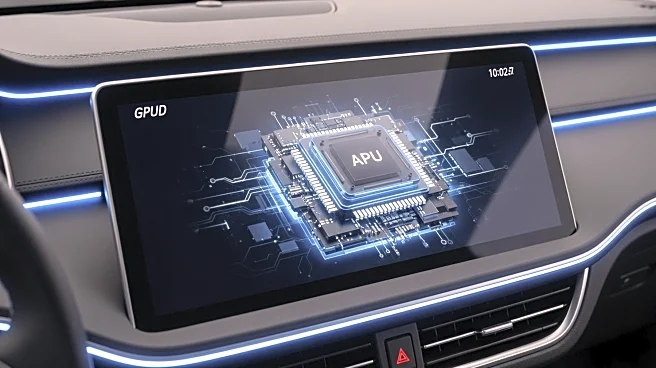What's Happening?
Tesla CEO Elon Musk has confirmed that the company will continue to utilize Nvidia's graphics processing units (GPUs) for training its models, despite developing its own AI chips. Tesla previously used Nvidia's Drive chips but switched to its own processors
in 2019. Musk emphasized that Tesla is not planning to replace Nvidia entirely, but will use both Nvidia and its own chips in combination. Tesla has announced a computing capacity equivalent to 81,000 of Nvidia's H100 chips. The AI5 chip, manufactured by Samsung and TSMC in the U.S., is part of Tesla's strategy to have an oversupply of AI chips for use in cars, robots, and data centers.
Why It's Important?
The decision to continue using Nvidia GPUs highlights the dominance of Nvidia in the AI market and the challenges faced by companies attempting to develop alternative solutions. Tesla's approach of combining its own chips with Nvidia's technology could lead to enhanced performance and cost efficiency in AI applications. This strategy may influence other companies in the industry to adopt similar hybrid approaches, potentially impacting the competitive landscape of AI chip development. The move also underscores the importance of maintaining robust computing capabilities to support advancements in autonomous driving technology.
What's Next?
Tesla's ongoing development of AI chips, including the AI5 and its successor AI6, suggests a continued focus on enhancing its technological capabilities. The production of these chips by Samsung and TSMC in the U.S. indicates a strategic investment in domestic manufacturing. As Tesla expands its AI chip production, it may lead to increased competition with established chip manufacturers like Nvidia and AMD. The company's efforts to achieve 'radical simplicity' in chip design could set new benchmarks for performance and cost efficiency in the industry.
Beyond the Headlines
Tesla's strategy to maintain an oversupply of AI chips reflects a broader trend in the tech industry towards securing critical components amid global supply chain uncertainties. The collaboration with major foundries like Samsung and TSMC highlights the importance of strategic partnerships in achieving technological advancements. Additionally, the development of AI chips tailored for specific applications, such as autonomous driving, may drive innovation in other sectors, potentially leading to new applications and markets for AI technology.















